| | 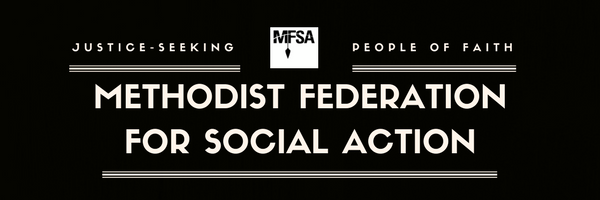 | | | Dear Justice-Seeker, This issue of MFSAVoices is jam-packed with resources and information. So much so that it won't all fit in your email message so be sure to click view entire message at the bottom of this email to view the entire issue. Our newsletters are designed to be used all month long. So take a quick glance and take note of important dates to add to your calendar but also come back in the following weeks to work your way through the action items. Gmail users—move us to your primary inbox - On your phone? Click the 3 dots at the top right corner, click "Move to" then "Primary"
- On your desktop? Back out of this email then drag and drop this email into the "Primary" tab near the top left of your screen
We continue to see the urgency of our work to make broad systemic change. Change that honors the dignity and worth of all people, puts people over money, and honors the earth and all her inhabitants. Since 1907, MFSA has been shining a light on injustice and organizing to change it. You make our collective work possible by your witness for justice every day in your church, community, and Annual Conference. MFSA does not receive any financial support from the United Methodist Church's giving channels. 100% of our budget is funded through your membership dues and your generosity in giving. | | | | | | 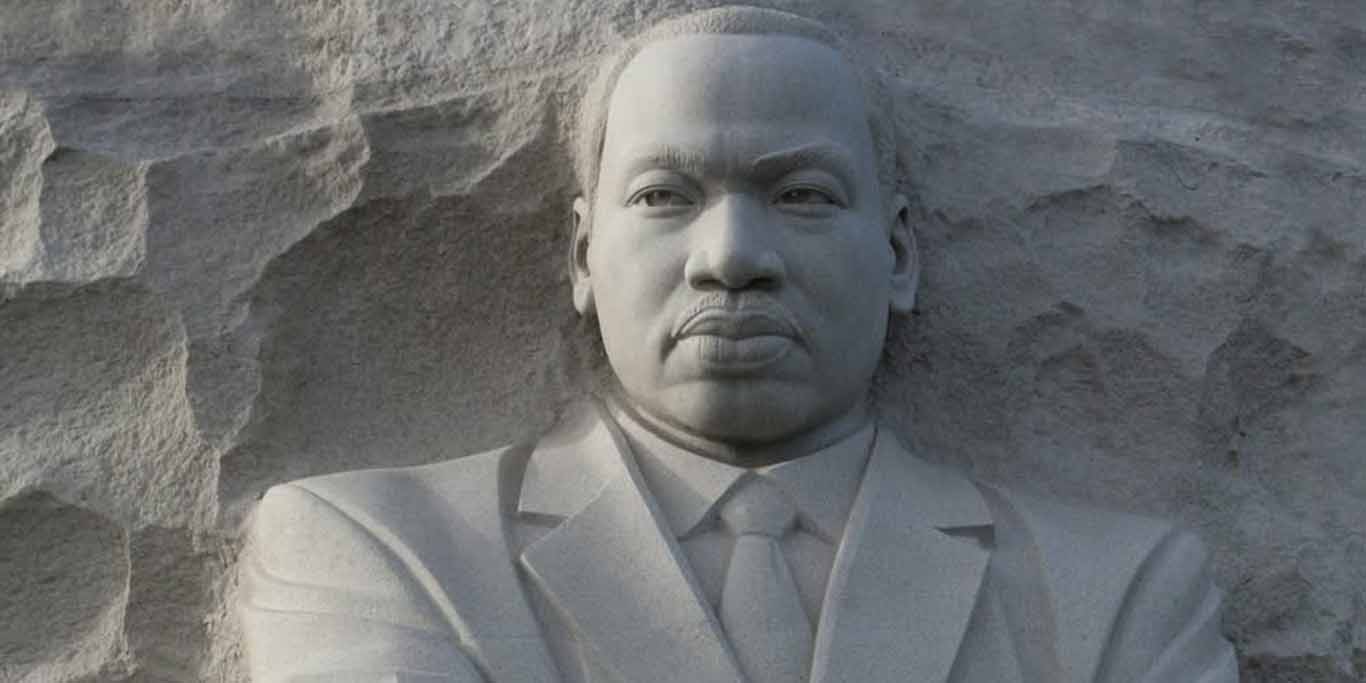 | Guided by Rev. Dr. Martin Luther King Jr. We are reminded of Dr. King’s enduring vision of justice, equity, and inclusion—a vision deeply rooted in faith and the sacred worth of every person. Methodist Federation for Social Action (MFSA) embodies this vision through advocacy, coalition-building, and action, working to transform our church and world. In 2024, we rallied around the 3 Rs—Regionalization, the Revised Social Principles, and the Removal of anti-LGBTQ language in the Book of Discipline—as key priorities for justice and inclusion within the UMC. To support these efforts, we developed Plumblines to guide delegates on critical issues, partnered with the Love Your Neighbor Coalition (LYNC) to amplify advocacy efforts, and stood in solidarity with justice-seeking pastors and churches in Africa and the Philippines. Through this collective work, we moved even closer toward our goal of building a truly inclusive and equitable church for all.
We are guided by Dr. King’s words: "The arc of the moral universe is long, but it bends toward justice." In 2025, we recommit to his legacy by organizing for the ratification of Worldwide Regionalization, supporting the implementation of the Racial Audit, and equipping churches to join the justice movement. We remain steadfast in resisting oppression and amplifying marginalized voices. Amid growing division and policies that harm vulnerable communities, our work for inclusion, equity, and compassion is more essential than ever. Your support—through financial gifts, volunteerism, and prayer—fuels this mission. Please consider making a gift to MFSA today to help build a more just future. Dr. King taught us that justice requires courage, faith, and collective action. Together, we can create lasting change. Thank you for your faithfulness and commitment to justice. With deep gratitude,
Bridget | | | | | | | | | | Preparing to Serve Migrant Communities | | 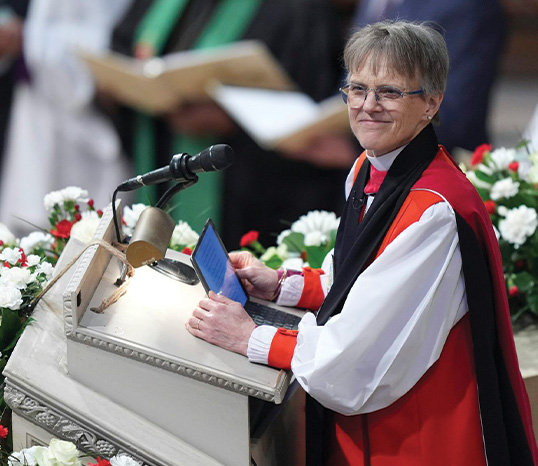
Bishop Mariann Edgar Budde: “I ask you to have mercy, Mr. President, on those in our communities whose children fear that their parents will be taken away and to help those fleeing war zones and persecution in their own lands.” | | This appeal came from the Episcopal Bishop of Washington, who made a direct plea to President Trump at a post-inauguration prayer service. The bishop expressed her commitment to continue praying for Trump, even after he responded by calling her a "radical hardline Trump hater." The Reverend clarified that she does not view Trump as an enemy and believes they can disagree respectfully. Rev. Dr. K. Karpen, Senior Pastor at Saint Paul and St. Andrew United Methodist Church in New York City, appeared on CBS News, expressing gratitude for the bishop’s remarks, noting their significance in reflecting the concerns of many Christians and people of other faiths. "We’re doing work with our immigrant communities and families," he said, highlighting the personal connections his church has developed with individuals seeking safety and refuge. "I was glad to hear her speak up and ask for mercy. It was a very gentle yet important approach." Rev. Karpen’s church, a Justice-Seeking Congregation, has a long history of outreach to immigrant communities, which he described as a cornerstone of their ministry. Asked about Trump’s immigration policies, which now affect places of worship and schools, Rev. Karpen expressed disappointment, citing a lack of understanding of both scripture and the Constitution. “Scripture says, ‘Welcome the stranger, for you were a stranger once in a foreign land.’ It also speaks of Jesus as a refugee, fleeing with his family to Egypt for safety from an oppressive regime.” | | | | 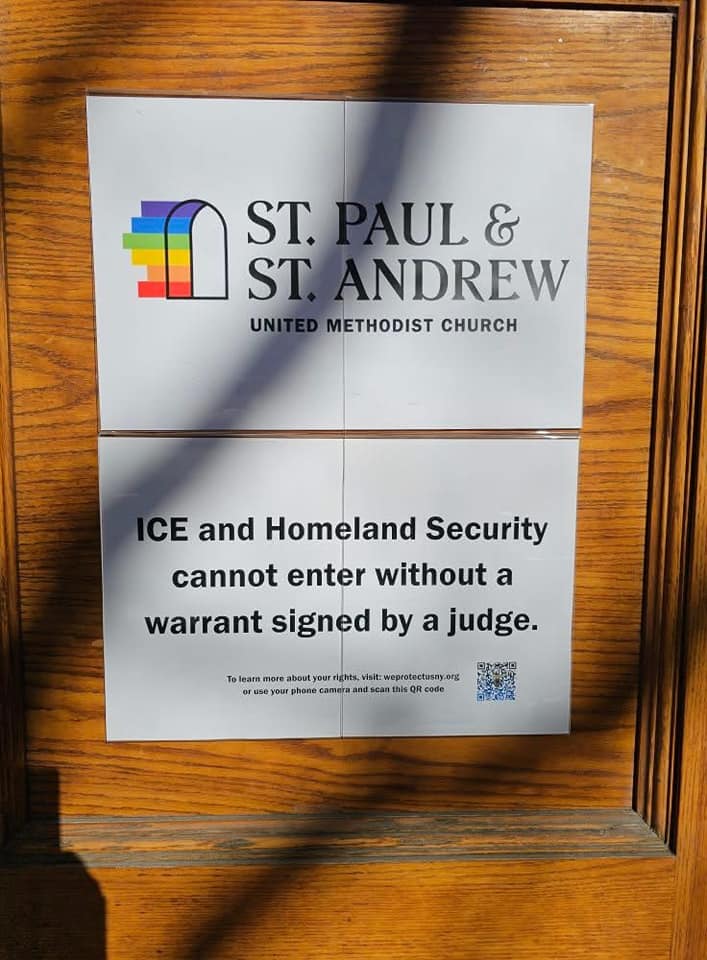 | Meanwhile, in Detroit, Rev. Paul Perez and Rev. Dr. Jill Hardt Zundel of Central United Methodist Church, another Justice-Seeking Congregation, spoke out about the administration’s latest executive orders, calling them “cruel.” Central has a long history of offering sanctuary, including housing the Rranxburgaj family for three years after they fled persecution in Albania. With new policies allowing ICE to enter churches and arrest immigrants, Perez warned of the devastating impact. “The only effect it will have is to strike fear into our communities, terrorizing another generation,” he said. “We will continue to stand as a sanctuary for all people.” | | | When asked about the challenges of advocating for immigrant communities, Rev. Karpen emphasized his church’s commitment to its principles. "We’re doing what we’ve always done, following the Gospel and Jesus’ mandate to extend ourselves to those who are afraid and in need. We’re not trying to defy the law; we’re trying to follow our religious principles." He also offered advice to others who feel called to help but worry about legal risks. “There are clear boundaries around what I.C.E. can and cannot do. We’ll continue to follow legal guidelines while serving those in need—families seeking safety and a better life, just like my ancestors once did.” | | 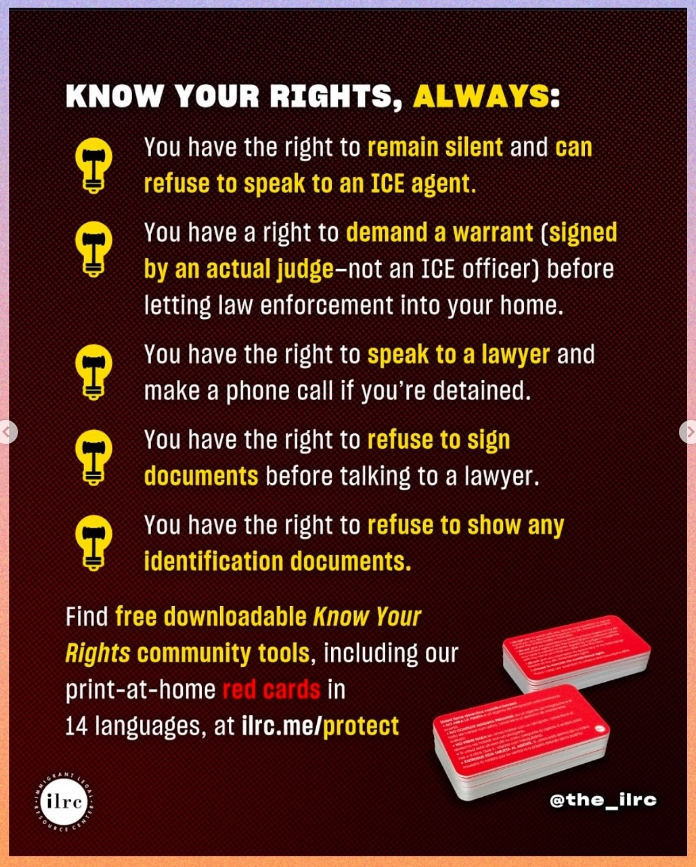 | | | Despite the growing risks, both congregations, along with many others throughout the connection, remain unwavering in their commitment to immigrant justice. They are actively engaging their communities in dialogue, providing resources, and ensuring that families facing deportation know they are not alone. “We’ve housed many families seeking asylum, and we’re going to continue to do that,” Perez affirmed. | | | | | | | | 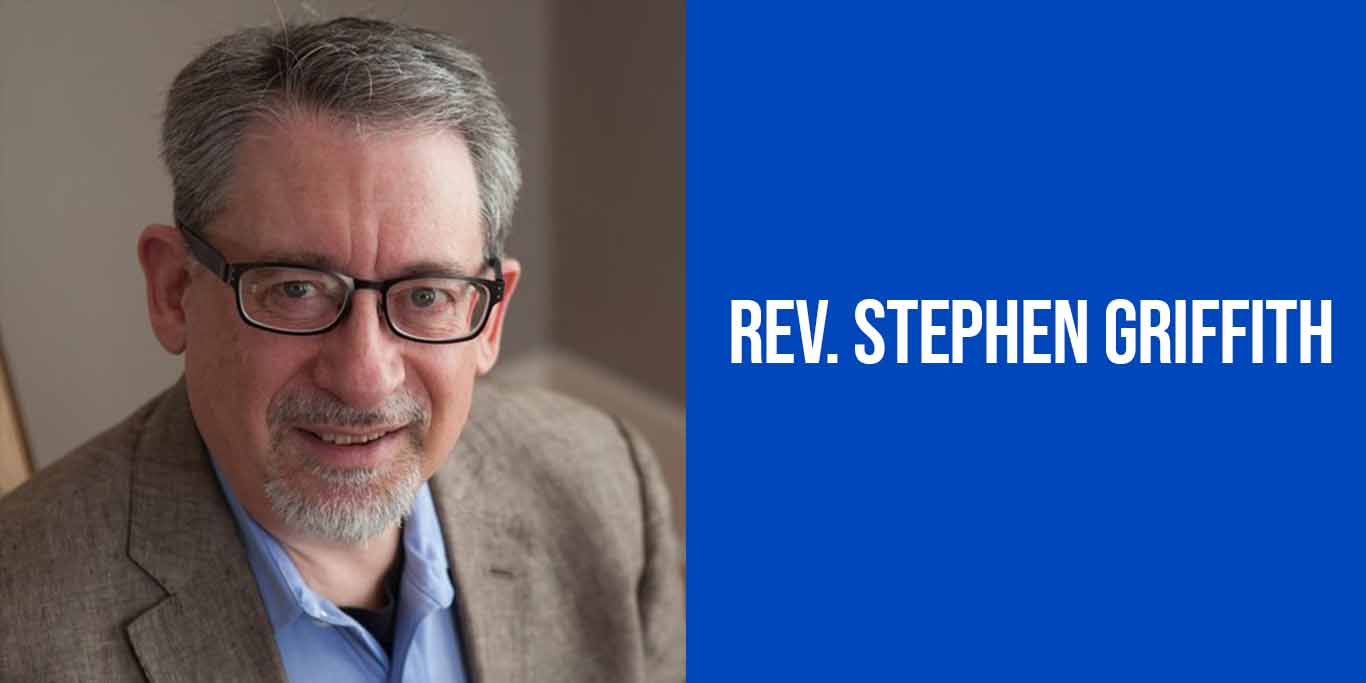 | MFSA Honors Rev. Stephen Griffith for His Dedicated Service on the Board of Directors The Methodist Federation for Social Action (MFSA) expresses heartfelt gratitude to Rev. Stephen Griffith (he/him/his) for his faithful service as a member of our Board of Directors. Beginning his leadership on the board representing the South Central Jurisdiction and later serving as the Chair of the Governance Committee, Rev. Griffith has brought wisdom, passion, and a steadfast commitment to justice, embodying MFSA's mission of transformative action within The United Methodist Church and beyond. A retired clergy member of the Great Plains Conference, Rev. Griffith has served the church and community with distinction for over 45 years. His ministry inclu... | | | | | | | | 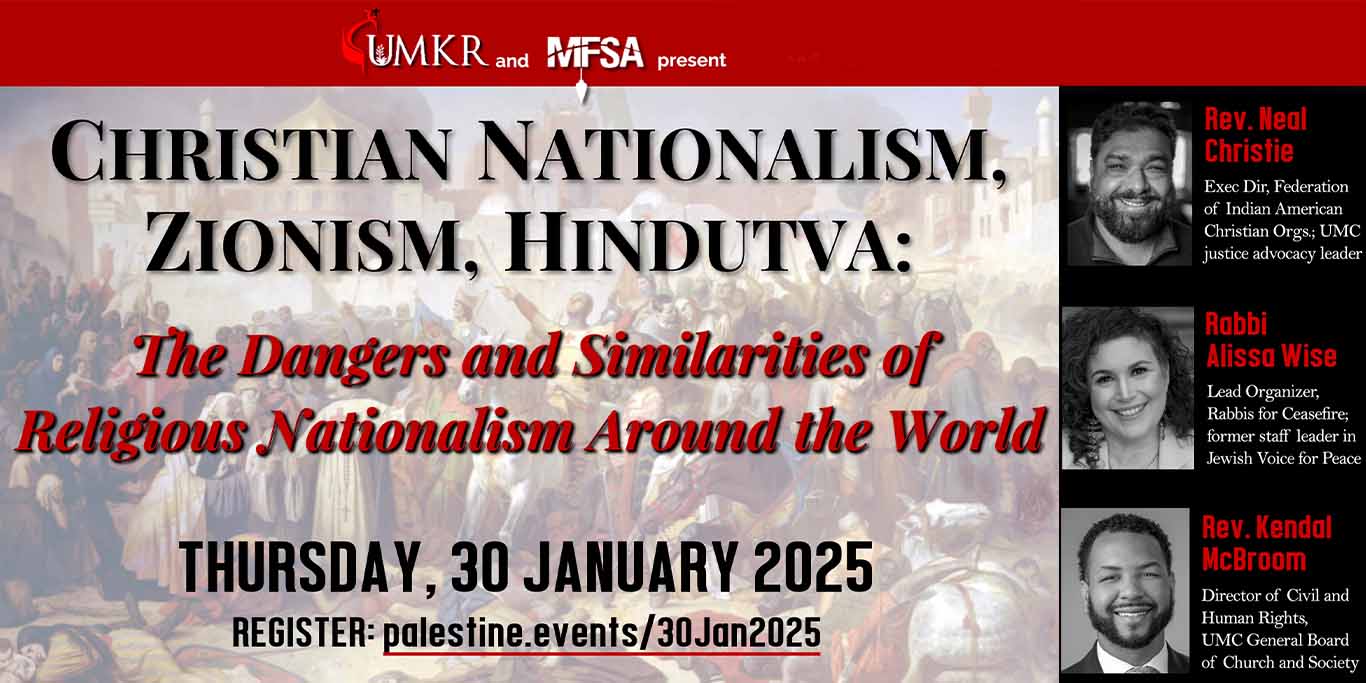 | CHRISTIAN NATIONALISM, ZIONISM, HINDUTVA: The Dangers and Similarities of Religious Nationalism Around the World Religious nationalism in the United States, Israel, and India: what threats do these dangerous ideologies bring to our lives and our communities, and what do they have in common? Religious nationalism has roots in racist perspectives about humanity and unholy beliefs about God's favoritism, conflating those in order to grant power and privilege to one people over another. Varieties of religious nationalism - the merging of religious faith, political philosophy, and national loyalty – have long served to justify political oppression and condone colonialist greed. We know religious commitment can be a positive force that inspires care for all people and for the planet. However, the misuse of religious traditions such as Christianity, Judaism, and Hinduism to harm and exclude whole segments of populations betrays the essential values of these faiths, while also violating universal human rights and greatly damaging our societies. In recent years, religious nationalism is sweeping the globe in ways that promote violence and authoritarianism. In this webinar, we look at three prominent and timely examples of religious nationalism today: White Christian Nationalism, Zionism (Jewish Nationalism), and Hindu Nationalism. The similarities between these ideologies are striking. When we expand our understanding of each to see the common ground they share, we can build strength in our mutual efforts as faith advocates to refute them and stem the harm they can do in our faith communities and in the world. An exceptional panel of experts presents and discusses the distinct features of each of these dangerous ideologies and helps us to understand the compelling intersections among them. This webinar recording is now available | | | | | | | | | | Los Angeles Fires Recovery The devastation in Los Angeles reminds us of the fragile systems that sustain life and the inequities that deepen suffering. As people of faith and justice, we grieve with those who have lost so much, but we also recognize the urgency of addressing the root causes of these disasters. The climate crisis is not a distant problem; it is here, now, intensifying the frequency and severity of events like these. To honor those impacted, we must speak the truth: our relationship with creation is broken, and healing it requires systemic change. Faith calls us to lament with those who suffer, amplify the voices of the most vulnerable, and challenge the systems that prioritize profits over people and the planet. Love demands action—advocating for climate justice, holding corporations accountable, and ensuring resources for recovery and resilience. While we work toward the greater systemic change needed to prevent future disasters, we can act now to support those most impacted. Please consider donating to Cal-Pac's Los Angeles Fires Recovery Fund to provide immediate relief and assistance. | | | | | | | |  | MFSA is now on Bluesky We've noticed many of our friends and partners making the move to this platform, and we're thrilled to join the conversation there. Stay connected with us for updates, advocacy, and conversations that matter. Connect with us @mfsavoices.org | | | | | | | | 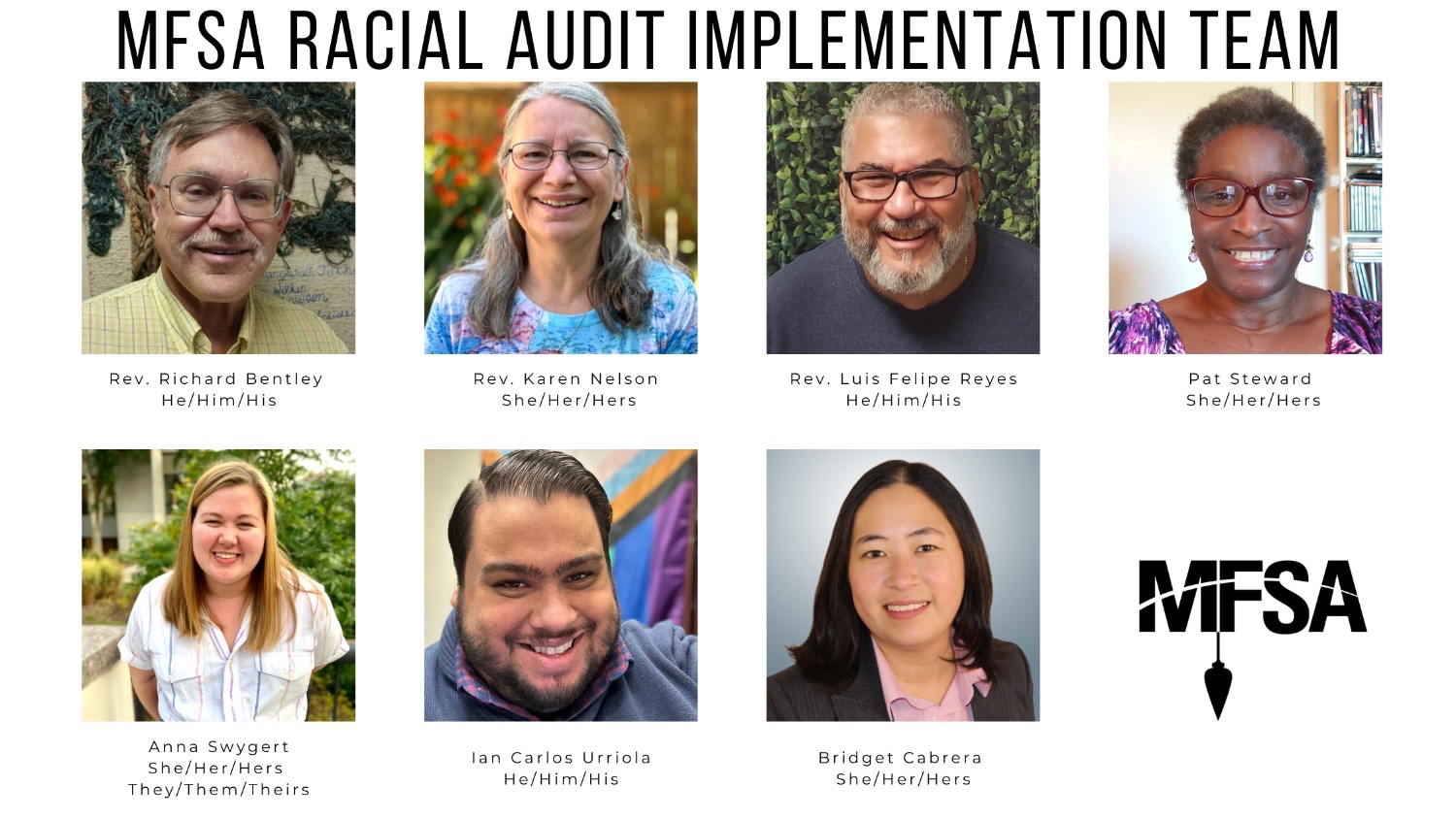 | Racial Audit Implementation Team Update The Racial Audit Implementation Team came into being almost one year ago. There are six members of the team, two of whom were part of the Racial Audit Team. Bridget Cabrera, our Executive Director, is also part of the team. The team has been challenged by a number of logistical things in the past year – finding dates in everyone’s busy schedules to meet monthly, taking time out to prepare for and attend General Conference in the spring, and working only by Zoom meetings. One of the things we discovered early in the process of working together was that we needed to build a strong level of trust among team members. The work we are doing requires a level of trust that makes it possible to say the difficult things that need to be said as we examine the themes of the audit. Right now, the team is in the midst of digging deeply into each of the six themes of the audit – examining what the themes say about MFSA, unpacking the language of the themes, and the ways in which these themes came into existence. What does the data tell us? And what do the stories about MFSA tell us? As we examine the themes, we are discussing how we might help the MFSA board and the MFSA chapters determine how to look at their work through the lens of these themes. We are also discussing what actions might work best for us to interrupt these themes in our organization. How might what we are discovering benefit from the recommendations for action provided by the racial audit team? As we continue this work, the Racial Audit Implementation Team will be providing additional reflections on the themes and what we are discovering and discussing. Just as the racial audit took longer to do than expected, we are finding that the implementation process is a much longer-term process than anticipated. We are moving at a speed that we believe provides the best possibilities for reducing further harm and for changing the nature of MFSA in the best possible ways. by Co-Convener Rev. Karen Nelson | | | | | | | | 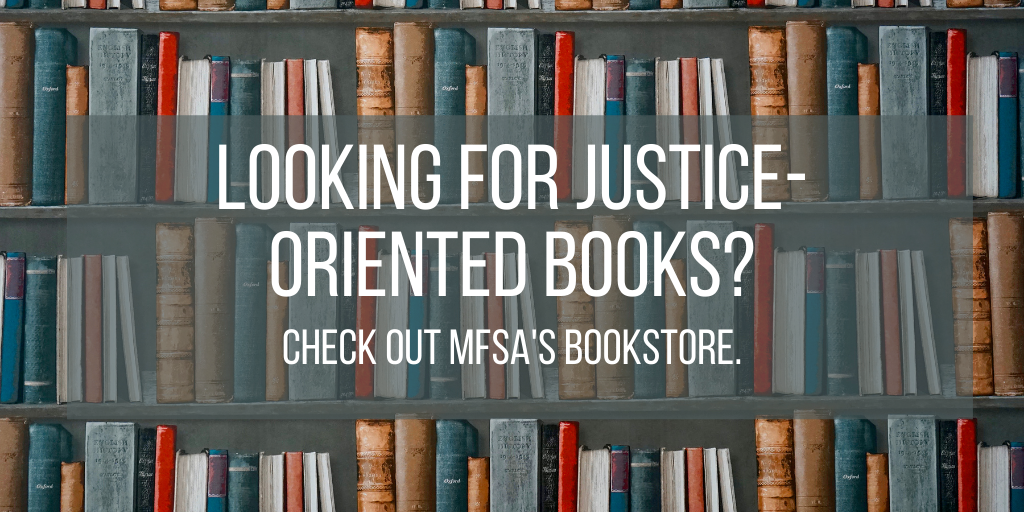 | | | | | | | | | | | 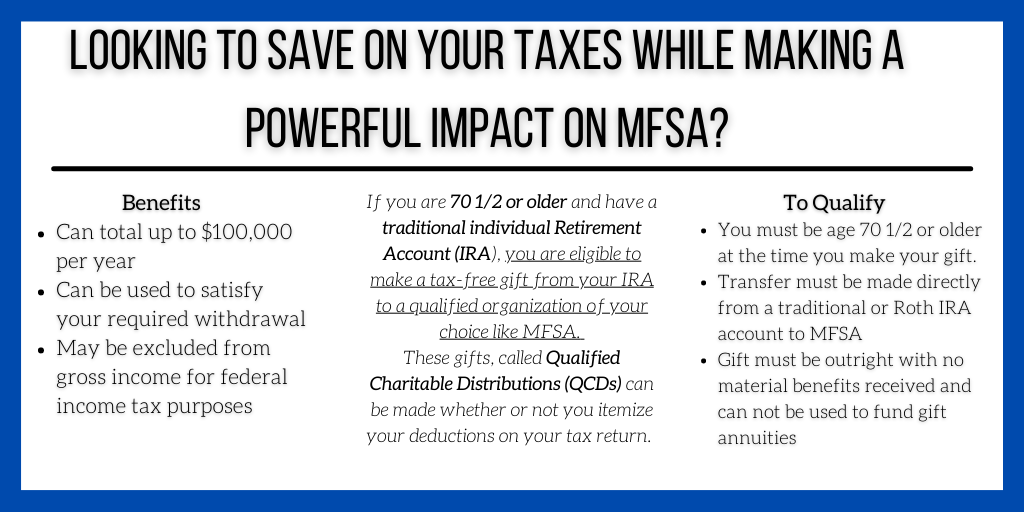 | | | | | | | | | Contact Us Methodist Federation for Social Action
996 Maine Ave SW #307
Washington, District of Columbia 20024
(202) 240-2546
bridget@mfsaweb.org | | | | | | | |